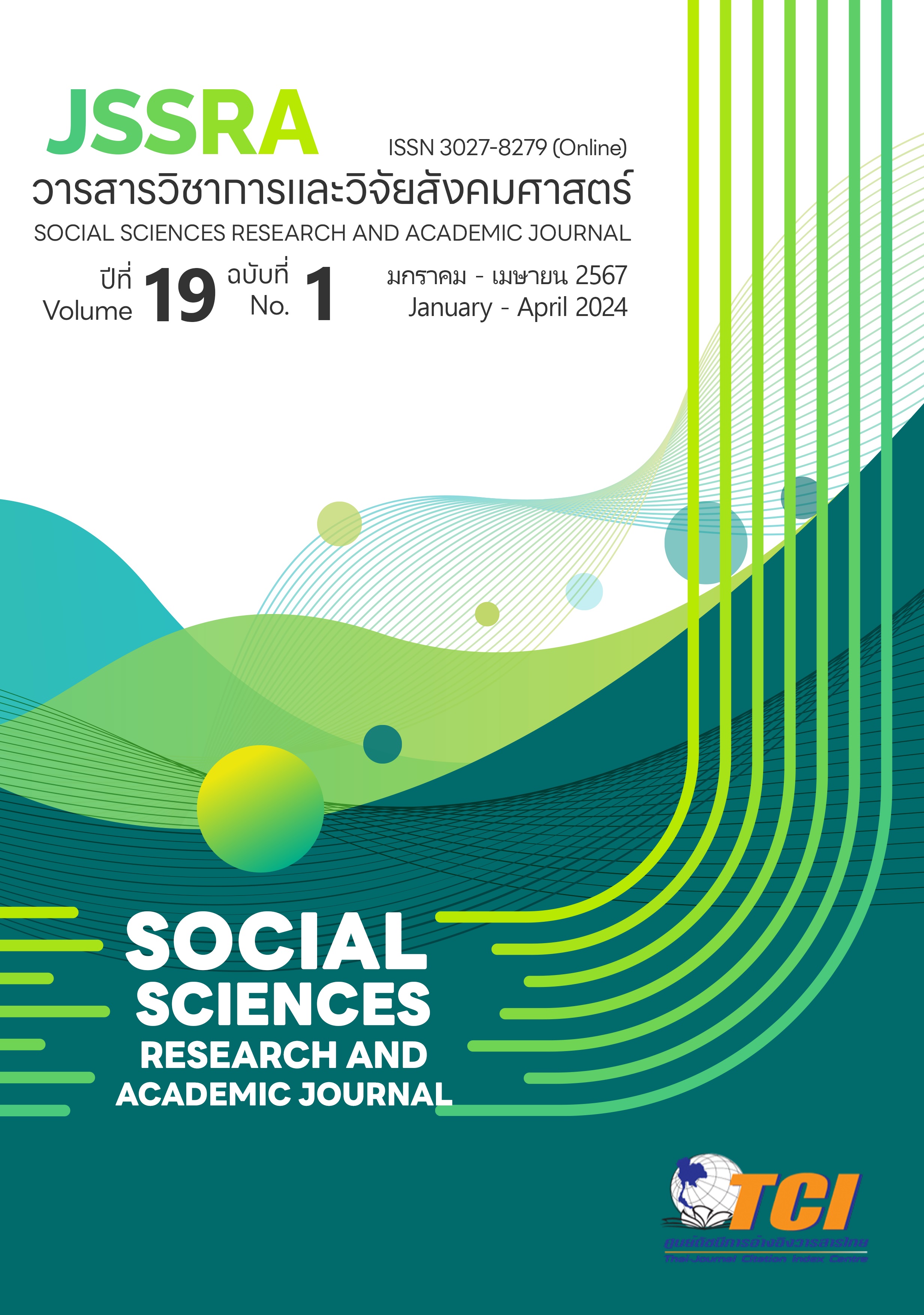The Development of Problem-Based Learning Management Model for Enhancing Academic Resilience of Pre-Service Teacher Students
Main Article Content
Abstract
This research aimed to 1) examine the construct validity of academic resilience measurement model of pre-service teacher students, 2) develop the problem-based learning management model to enhance the academic resilience of pre-service teacher students and 3) study the effect of the problem-based learning management model. The samples were divided into 2 groups: (1) The samples used to study the components of academic resilience were 595 undergraduate pre-service teacher students from public universities, autonomous universities, and Rajabhat Universities located in 4 regions of Thailand: the North, the Central, the Northeast, and the South (2) 26 undergraduate pre-service teacher students from Srinakharinwirot University who had the average academic resilience score below the 25th percentile down randomly selected as an experimental group and a control group, each of which had 13 participants. The research instruments were the academic resilience test with a reliability coefficient of .92 and the problem-based learning management model for enhancing academic resilience of pre-service teacher students. The data were analyzed by means, standard deviation, and t-test.
The results showed that; 1) The academic resilience measurement model was consistent with the empirical data that standardized factor loading ranged from 0.76 to 0.93 with statistically significance at the .01 level for all components, 2) The problem-based learning management model to enhance academic resilience consisted of 5 steps. Step 1: Identify the problem Step 2: Understand the problem Step 3: Study and research Step 4: Consider the solution Step 5: Summarize and present the solution 3) after the experiment, the academic resilience score of the experimental group was higher than the control group and before the experiment with statistically significance at the .01 level.
Article Details
References
Barrett, T. (2017). A New Model of Problem-Based Learning: Inspiring Concepts, Practice Strategies and Case Studies from Higher Education. Maynooth: AISHE.
Barrows, H. S., and Tamblyn, R. M. (1980). Problem-Based Learning an Approach to Medical Education. New York: Springer.
Bartley, M., Schoon, M. R., and Blane, M. (2010). Resilience as an Asset for Healthy Development, in
A. Morgan, M. Davies, and E. Ziglio (Eds.), Health Assets in a Global Context, (pp. 101-115). New York: Springer.
Cassidy, S. (2016). The Academic Resilience Scale (ARS-30): A New Multidimensional Construct Measure. Frontiers in psychology, 7, 1-11.
Chen, J. Y. (2011). Problem-Based Learning: Developing resilience in Nursing students. Kaohstung Journal of Medical sciences, 27(6), 230-233.
Cheng, V., and Catling, J. C. (2015). The Role of Resilience, Delayed Gratification and Stress in Predicting Academic Performance. Psychology Teaching Review. 21(1), 13-24.
Cohen, L., Manion, L., and Morrison, K. (2017). Research Methods in Education. (8th ed.). Routledge. https://doi.org/10.4324/9781315456539
Coronado Hijón, A. (2017). Academic Resilience: A Transcultural Perspective. Procedia - Social and Behavioral Sciences, 237, 594-598.
Dabaghi, Z., Hashemi, Z., and Ashkzari, M. k. (2019). The Effect of Social Problem-Solving Skills Training on the Educational Resilience of Children in Labour. Iranian Journal of Learning and Memory, 1(4), 7-15.
Evensen, D. H., and Hmelo, C. E. (Eds.). (2000). Problem-Based Learning: A Research Perspective on Learning Interactions. London: Lawrence Erlbaum Associates Publishers.
Hair, J. F., Black, W. C., Babin, B. J., and Anderson, R. E. (2010). Multivariate Data Analysis. (7th ed.). New York: Pearson.
Ijadi-Maghsoodi, R., Marlotte, L., Garcia, E., Aralis, H., Lester, P., Escudero, P., and Kataoka, S. (2017). Adapting and Implementing a School-Based Resilience-Building Curriculum Among Low-Income Racial and Ethnic Minority Students. Contemporary School Psychology, 21(3), 223-239.
Kang, M., Yoonjin, P., Choi, S. Y., and Lee, S. (2018). The Effects of PBL (Problem-Based Learning)
on Academic Resilience, Learning Flow, and Academic Motivation of Nursing Students.
The Korea Academia-Industrial cooperation Society, 19(6), 291-298.
Kemp, S. (2011). Constructivism and Problem-Based Learning. Singapore: Temasek Polytechnic, Learning Academy.
Knight, C., Balatti, J., Haase, M., and Henderson, L. (2010). Preservice Teacher Stressors and Their Reactions to Those Stressors: Resilient Responses, in Proceedings of Australian Teacher Education Association Conference. (pp. 1-9). Townsville: ATEA 2010 Australian Teacher Education Association Conference.
Lambros, A. (2004). Problem-Based Learning in Middle and High School Classrooms a Teacher's Guide to Implementation. California: Corwin Press.
Le Cornu, R. (2009). Building Resilience in Pre-Service Teachers. Teaching and Teacher Education, 25, 717-723.
Martin, A. J. (2002). Motivation and Academic Resilience: Developing a Model of Student Enhancement. Australian Journal of Education, 46(1), 34-49.
Martin, A. J., and Marsh, H. W. (2006). Academic Resilience and Its Psychological and Educational Correlates: A Construct Validity Approach. Psychology in the Schools, 43(3), 267-282.
Meneghel, I., Martínez, I., Salanova, M., and De Witte, H. (2019). Promoting Academic Satisfaction and Performance: Building Academic Resilience Through Coping Strategies. Psychology in the Schools, 56(6), 875-890.
Mirza, M. S., and Arif, M. I. (2018). Fostering Academic Resilience of Students at Risk of Failure at Secondary School Level. Journal of Behavioural Sciences, 28(1), 33-50.
Office of the Secretariat of the Council of Education. (2007). Problem-Based Learning Management. Bangkok: Pim Dee.
Ottoway, A. K. C. (1966). Learning through Group Experience. London: Routledge & Kegan Paul.
Rojas F., L. F. (2015). Factors Affecting Academic Resilience in Middle School Students: A Case Study. GIST - Education and Learning Research Journal, 11, 63-78.
Radhamani, K., and Kalaivani, D. (2021). Academic Resilience among Students: A Review of Literature. International Journal of Research and Review, 8(6). 360-369.
Veale, A. (2011). Fostering Resilience in Adolescents. In D. Skuse, H. Bruce, L. Dowdney, and D. Mrazek. (Eds.), Child Psychology and Psychology-Frameworks for Practice, (pp. 78-83). New Jersey: John Wiley & Sons.
Wanichbancha, K. (2008). Using SPSS for Windows in data analysis. (11th ed.). Bangkok: Chulalongkorn University Press.
Wiratchai, N. (2012). Statistics for use. Bangkok: Icon Printing.


